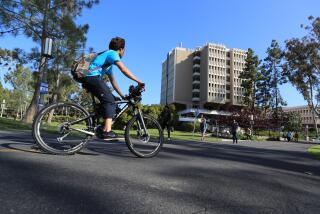Ex-Student Sentenced for Hate E-Mail
- Share via
SANTA ANA — In what prosecutors hope is a strong signal to cyberspace hatemongers nationwide, a former UC Irvine student who used the Internet to threaten Asian American students was placed on probation Monday for a year and ordered to attend racial tolerance counseling.
Richard J. Machado, 21, who served a year in jail while awaiting trial, is the first person in the country to be convicted of charges related to using the Internet to send death threats.
U.S. District Judge Alicemarie H. Stotler, who also imposed a $1,000 fine, could not add prison time to the sentence because the year Machado spent behind bars was the maximum sentence for the crime.
Under the terms of probation, Machado was ordered to stay away from UC Irvine’s computer labs and its video arcade, a locale the former student had frequented. Although the prosecution had asked that Machado’s use of a computer be limited to work and school, Stotler denied the request.
“I find it entirely unnecessary to restrict the defendant from the use of computers,” Stotler said, adding such a limit would be onerous.
Assistant U.S. Atty. Michael J. Gennaco, who prosecuted the case, said outside the courtroom that the sentence was fair and will send a message to computer users nationwide that they cannot get on the Internet to threaten people.
“This draws a line in the sand on what’s permissible and what’s impermissible in cyberspace,” he said. “And threats will not be tolerated.”
Machado, who lives in Long Beach with his mother and works at a temporary employment agency, was convicted earlier this year of violating the right of Asian American students to attend a public university. A previous jury had deadlocked 9 to 3 in favor of acquittal. Machado, who was released from jail in February on $10,000 bail, clenched his jaw and showed no emotion during the sentencing. Afterward, he declined to comment.
Machado testified during the trial that he meant no harm by the messages and was bored at the time he sent them. He plans to enroll at Long Beach City College, where he will study science, said his brother, Carlos Machado.
“It was supposed to be joke. And they blew it up, way out of proportion,” Carlos Machado, 22, said outside the courtroom. “I think it’s just to get their point across. [Computer access] is a new thing, and they want to make sure that it’s under their control.”
*
The case touched on several important issues--the debate over the freedom of speech in cyberspace, the growing emergence of hate groups using the Internet as a forum and the extent of the government’s ability to police the Internet. “We’re going to see more of [these cases], especially since the Internet gives some people a cloak of anonymity,” said Gabriel Jack Chin, law professor at Western New England College in Springfield, Mass.
Federal agents are investigating another possible hate crime involving threatening messages sent to at least 40 Latino faculty members at Cal State L.A., Gennaco said, adding that no charges have been filed in that case.
Machado, who had been expelled from school, was ashamed to tell his mother and continued to have his brother drop him off at UC Irvine. On Sept. 20, 1996, Machado sent an anonymous message to 59 mostly Asian American students. The message, signed “Asian Hater,” warned that “I personally will make it my [life’s work] to find and kill every one of you personally. OK? That’s how determined I am. Do you hear me?” He also accused Asian Americans of being responsible for “all the crimes that occur on campus.”
The e-mail angered and disturbed many students, some of whom testified that they were prompted to arm themselves with pepper spray, refused to go out alone after dark and became suspicious of strangers. Others shrugged off the message as a bad joke.
Machado was arrested in early 1997 in Nogales, Ariz.
Deputy federal Public Defender Sylvia Torres-Guillen had argued that Machado is a troubled man who meant no harm and called an expert witness who compared the threat to “a classic flame,” online slang for an angry message that is more annoying than harmful.
More to Read
Sign up for Essential California
The most important California stories and recommendations in your inbox every morning.
You may occasionally receive promotional content from the Los Angeles Times.












